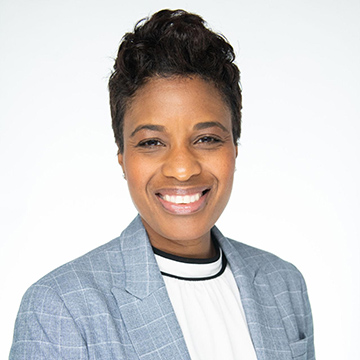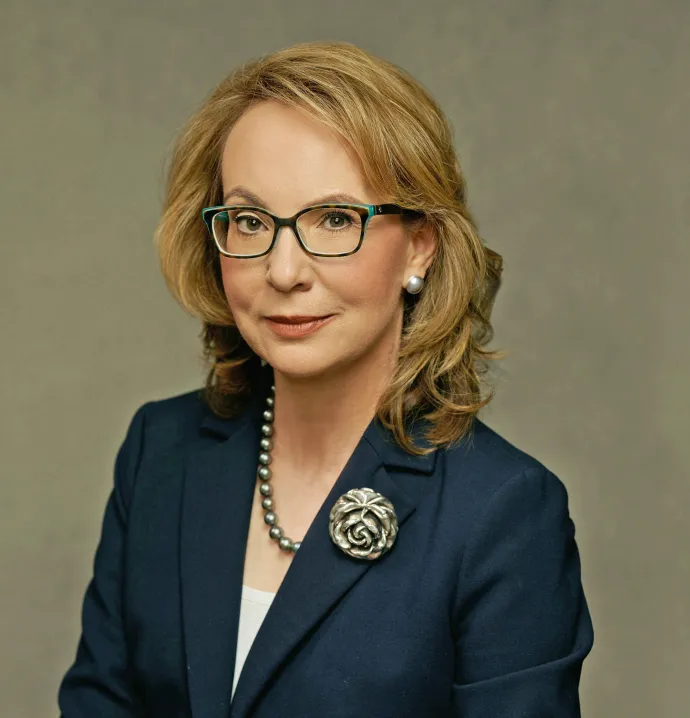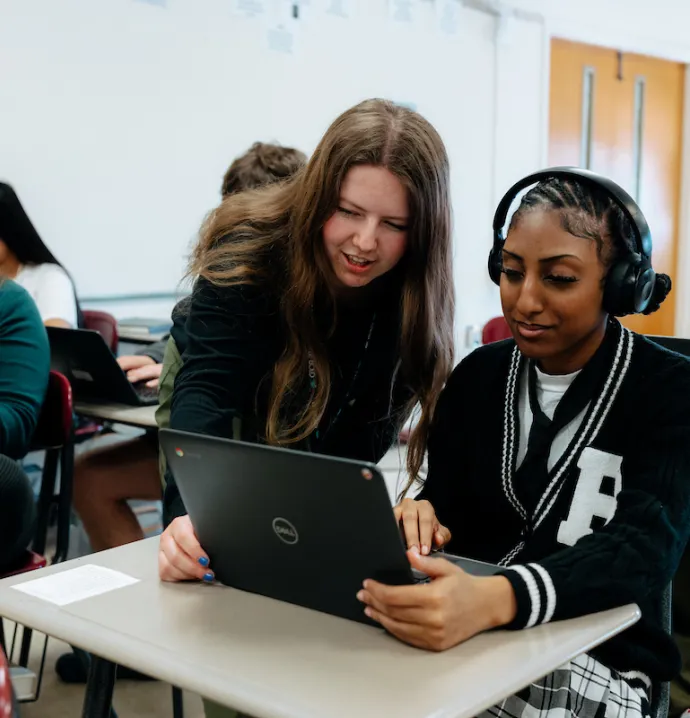Reimagining teaching
Reimagining teaching
UNI alumna Jennifer Stimpson, EdD., has taught a girls’ leadership class in Uganda while living with no Wi-Fi; took a star turn in Oprah’s “O” magazine being recognized as a STEM visionary, won a $10,000 inspiration grant from former basketball superstar Michael Jordan’s Fundamentals Grant Program, and now serves as an Albert Einstein Distinguished Educator Congressional Fellow in Washington, D.C.
So what could be the next step in her amazing career, first as a chemist and now a renowned chemistry teacher?
As the nation slowly emerges from the coronavirus pandemic, Stimpson, pictured on the right, says she wants to help with an urgent and vitally important task: To “completely reimagine” teaching.
Stimpson’s work as a chemistry teacher for 20 years, both at underrepresented and highly prestigious K-12 schools, presages what she’d like to see globally: “Classrooms will be units of specialized learning environments,” she said of her vision and mission. “Students will focus on things they do well. Small learning communities will breed new levels of innovation. They may or may not have an adult as a teacher. The classroom leader might be a mentor.”
In her words, she wants to see classrooms become “spaces of innovation cultivating what’s missing in society.”
And of course, STEM and technology will play big roles.
“If this generation is not engaged in STEM, we are already behind,” Stimpson said. “The jobs of tomorrow all require high levels of technological understanding and application. To have a qualified workforce, there has to be a continual engagement of some type of computer-aided technology and tech integration.”
Beginning her journey
Stimpson grew up with intimate knowledge of STEM, since both of her parents were pharmacists — her mother, a clinical pharmacist and her father, the owner of his own compounding pharmacy, mixing ingredients to formulate medicines to accommodate people who had problems taking pills or other special needs.
“He was teaching people how to take care of themselves in such a way that empowered them to know what they needed to have a healthy life,” Stimpson said. “I look at pharmacy as an extension of chemistry.”
Stimpson credits her experiences as a graduate student at UNI — she earned her degree in chemistry in 1996 — with helping her “learn how to survive and how to be resilient.”
She said that, as a Dallas native who earned her undergraduate chemistry degree at Dillard University in New Orleans, La., a historically black college and university, she faced a culture shock moving to a much different Midwestern university. She chose UNI after she took a professor’s advice to attend a career fair, since she was still on a waitlist to get into medical school — her first career choice was to be a doctor. While at the career fair, she had what she described as a meaningful and convincing conversation with the UNI dean of natural sciences. So she chose graduate school over her only other offer at the time — the spring of her senior year in college — a $24,000-a-year chemist’s job at Los Alamos National Laboratory.
Being at UNI in the 1990s felt isolating at first.
But Stimpson credits her chemistry professor, Kirk Manfredi, and schoolmate Phillip Kisanga, a native of East Africa who is now a research scientist, with befriending her and showing her support, compassion and generosity.
And she said she grew from learning how to navigate through difficult situations.
“When you’re the one who is different, people have to contend with you,” Stimpson said. “You get to define your difference. People have to figure out how to be in the same space as you.”
John Bumpus, UNI professor of chemistry and biochemistry, worked with Stimpson and others on research into how a fungus might make coal soluble. The idea was that soluble materials might become a source for making methane from coal.
“The story of Jennifer is what she did after [UNI],” Bumpus said. “By all metrics, she has carved out for herself a wonderful career, especially in being a role model for young women of color and encouraging them to become interested in careers in STEM.”
Finding her calling
Stimpson’s self-discovery came when she was working as a career chemist at the U.S. Drug Enforcement Administration and her lab director encouraged her to volunteer at a local elementary school in West Dallas that had no science teacher or science program. Her once-a-week presentations to the fourth-grade class turned into a passion.
For her community service, Stimpson won the DEA’s highest honor — the Administrator’s Award, a recognition usually awarded to an agent for service in the line of duty or for a breakthrough discovery. Four months later, Stimpson left the DEA to become a high-school chemistry teacher at the Yvonne A. Ewell Townview Magnet Center.
“I saw these kids who had a low interest in learning, who hailed from communities with little resources and few people concerned about their well-being or who encouraged them to learn for the sake of learning,” Stimpson said. “I wanted to ensure [that the students] were learners for the sake of learning. I tried my best to manifest authentic curiosity and elevate learning so they could connect science to their everyday experience. I wanted my chemistry class to be not a course they took, but an experience.”
She went on to become the first Black high-school teacher in the 107-year history of the prestigious PreK-12, all-girls college-prep Hockaday School in Dallas.
After Stimpson was selected as the only teacher among 3,000 applicants to be recognized in Oprah Winfrey’s magazine as a visionary, in 2008, she won an inspiration grant from the Michael Jordan foundation. She ended up getting $100,000 from the foundation in 2010 and distributed $25,000 of the total to the three lowest-performing schools in the Dallas Independent School District.
While teaching, Stimpson created and ran Knowledge In Chemistry (KIC) summer camps for over 15 years, designed to give girls in grades 5-8 (ages 10-14) hands-on research experience in a science lab.
In 2019, Stimpson was chosen one of 125 “If/Then” Ambassadors by the American Association for the Advancement of Science and If/Then Initiatives. The ambassadors act as role models to inspire middle-school girls. Stimpson was among a handful of teachers to join ecologists, data scientists, athletes, doctors and research scientists as an ambassador. She will be honored for service to science with a life-sized statue of her likeness.
Now, she’s earned an Ed.D. from the University of Pennsylvania and is living out the equivalent of the Pulitzer Prize of fellowships for science educators. Her latest triumph is being awarded the U.S. Department of Energy’s Albert Einstein Distinguished Educator fellowship.
She has been assigned to work in the U.S. House of Representatives, where she is teaming up with the Bipartisan HBCU caucus to develop a podcast series about the future and promise of an HBCU education. She’s the creator and executive director.
Beyond Stimpson’s prestigious work, her goal is to live in a sustainable home — an ideal she experienced when she lived in Uganda for six weeks while heading up the girls’ leadership program.
“By 2050, I would love to be 100 percent sustainable with my home,” she said, describing it as complete with a solar-powered roof, a water tank, drip irrigation system, geothermal heating and even lockable taps for the faucets.




